The Islamic Call

CHAPTER VI
THE MANNER OF THE CALL
1. - Utilization of National Feeling
The Muhammadan Call made use of every possible right inducement to its acceptance. It is not every or any inducement that it used. It must be the right inducement that has in it nothing wrong, nothing false. It is God's own Call to humanity through His Messenger Muhammad, and it must therefore have followed God's own natural laws which govern human nature. We shall therefore make a study of its manner, in the hope of discovering something of those laws.
This Call, though religious, ridiculing particularly idol-worship sacred to the Arabs, yet it did not lose sight of the fact that those Arabs were chosen by God for first accepting the new Faith then carrying it to other nations. Further, the Apostle himself through whom the call was raised was one of them, and like themselves, a citizen of Arabia.

"There hath come unto thee a messenger, (one) of yourselves, unto whom aught that ye are overburdened is grievous, full of concern for you, for the believers full of pity, merciful" (Surah IX, 128).
Had this Call neglected to hint at the fact that the Arabs were a distinguished and chosen people worthy of carrying this mission, and that its propagation needed their hearty collaboration, one spring of action would have been neglected, and the desired success would have been much delayed.
The Arabs were not a people rendered corrupt and helpless through the evils of generations, as some suppose, but were a people full of energy, possessing cardinal virtues particularly courage, generosity, and the active tendency towards Liberty and equality.
When still a young man, the Prophet joined an alliance constituted by certain chiefs of Quraish, called the pact of "Al Fudool", in which they pledged themselves to support "the oppressed" until he got his due. Of this alliance the Prophet says:
"I would not take the choicest of riches in place of an alliance that I had witnessed at the house of Ibn Gadaan, and should I be appealed to in its name, I would respond at once".
Had the Arabs been loose and decrepit in character, it would naturally have been almost impossible to turn them, in so short a period, into a nation which, in a still shorter period, were able to strike North, East and West carrying the torches of liberty, justice and equality wherever they went.
The strong elements in the Arab community lacked only guidance and leadership to get the upper hand. They were like coals smoldering under ashes; they did not glow though they gave heat and warmth. The Apostle blew into them and they glowed turning other elements into fire. He in time unified and integrated the elements of force in the Arabs into power to be directed where it should.
Through Islam he restored to them Faith, faith in God and faith in themselves, as a Muslim became the best among nations. So the divine Book tells them:

"Ye are the best community that hath been raised up for mankind. To enjoin right conduct and forbid indecency; and ye believe in Allah".
They are told further that as long as they maintain on their part as a community, such a standard of moral excellence, their distinction over other nations will continue in this world and in the Hereafter:
"Thus we have appointed you a middle nation that ye may be witnesses against mankind, and that the Messenger may be a witness against you". (Surah II, 143 in part).
The appeal to Arab national feeling was mostly incidental. but not the less powerful for that. Here is another prominent example: Muslims ill prayer turn their faces five times daily to the House of God, to the Kaabah:
![]()
"Allah hath appointed the Kaabah, the sacred House a standard for mankind". (Surah 5, verse 97).
The Kaabah was built by Abraham and Ismail by God's order. It happened to be the first place sanctified by the Arabs through long-established tradition, from the time of Ismail, their forefather. They firmly believed that its sacredness, it holy nature, was the reason for the failure of the foreign Abraham to gain possession of the holy spot with the sacrilegious intention of converting?it into a church. They honoured it so much and derived honour therefrom, that on the occasion of rebuilding it, the Quraish tribes nearly fought together for the honour of laying ((the black stone )) back in its proper place. The matter was nicely settled[1] by the Prophet himself when in his thirty fifth year, that is five years before his Mission.
It is remarkable that Muslims at first were directed to face towards Jerusalem, and not the Kaabah, in prayer. This continued throughout the Meccan period and for a short period at Madinah. The reason at Mecca was obviously lest the Meccans would take facing the Kaabah idols as an act of worship, but it might have served also as a silent protest against the hostile attitude of the idolaters towards the Prophet and his companions, forcing the emigration of the latter to Abyssinia and ultimately the emigration generally called the flight of the Muhagireen to Madinah.
The practice at Madinah was a natural continuation to that at Mecca, but it might have also served the purpose of reconciling for a time the people of the Scripture, as the Christians and Jews are called, to distinguish them from the idolaters, Facing towards Jerusalem at Madinah was a hard trial to both the Arab believers and the Jews of Madinah. The former though wishing in their hearts to face towards Mecca continued to face towards Jerusalem in obedience to the Divine order, but the latter failed in the trial, mistaking it for a sign of superiority of Judaism. When the Divine order came to face in prayer towards Mecca, for good, the believers at Madinah, including the Prophet, rejoiced and probably disbelievers at Mecca also.
God has ordained His House, the Kaabah for all Muslims the Arabs included as a symbol of unity and security

&n?sp; "And I remember when we made the House (at Mecca) a resort for mankind and a sanctuary (saying) Take as your place of worship tile place where Abraham stood (to pray). And We imposed a duty upon Abraham and Ismail (saying) : Purify My House for those who go around and those who meditate therein and those who bend down and prostrate themselves (in worship) !. (Surah II, 125).
So was the pilgrimage to this Holy place ordained one of the cardinals of Islam - an imposed obligation on those who can afford to do it. Once in a life time, Pilgrims have to go seven times round the Kaabah. This "tawaf "is one of the necessary performance of any pilgrimage, without the observance of which the whole pilgrimage is invalidated, This going round the House of God, this " tawaf " , is not a mere ceremonial devoid of purpose; its signifance is well brought out by a distinguished Western-Muslim writer Muhammad Asad (Leopold Weiss) when he says in his " Islam at the Cross roads " :[2] (If we move in a circle around some object, we thereby establish that object as the central point of our action, The Kaabah, towards which every Muslim turns his face in prayer, symbolizes the Oneness of God. The bodily movement of the pilgrims in the " tawaf " symbolizes the activity of human life ! . Consequently the tawaf implies that not only our devotional thoughts, but also our practical life, our actions and endeavors, must have the idea of God and His Oneness for their centre - in accordance with the words of the Holy Qur'an.

"I have not created Jinn and Man but that they should worship Me". (Surah 51, verse 56),
Some of the rites observed in pilgrimage before t?e Islamic Call, in pre-Islamic days, were retained by Islam since, being remnants of the correct rites ordained from the time of Abraham and Ishmael (Ismail), they were in no sense contradictory with the cardinals of the Faith or the essentials of Monotheism. As pointed out above, pilgrimage rites are of essential significance to all Muslims, but their partial natural agreement with pre-Islamic practice incidentally served the purpose of satisfying Arab national feeling, and thus there was no impassable gulf between the new and the old.
It is impossible for any nation to break suddenly loose from all established traditions and beliefs once for all. Such an all round radical change, would have made the Islamic Call impossible of realization. It was Providential, therefore, that there was some common basis of right and truth between the new and the old to serve as a meeting ground to settle the points of difference according to Truth and Right and Reason. It helps the cause of the new to make the people of the old feel that the new Call fights only against what is wrong and false, confirming what is right and true in the standing order of things.
The foresighted reformer versed in peoples' psychology and social evolution should make his new bricks from the soil on which he is trying to raise his super structure, and from its rocks should cut and chisel his foundation stones. It seems to be a general social law that the present derives its very existence wholly or partially from the past, and the future is built wholly or partially on the present. To go contrary to this is to contradict historical fact and ignore the divine laws operating in the sphere of human activity.
It is natural to suppose that the Islamic Call observed those divine laws to perfection. It was as perfect an application of them as is possible to humanity. It was God's Call guided by Him through His Apostle according to His natural laws. It used the right natural springs of individual and collective human activity in the right way. The right appeal to national feeling as far as it could rightly go was one such example. Another was the right appeal to Hope, justifiable hope raised to a maximum because based on maximum conformity to natural laws, the laws of the Author of Nature, human or otherwise, God's obedience being the most general form of these laws. Brilliant future here and complete eternal happiness in the Hereafter were comprised by that Hope. What greater hope can there be ? What greater guarantee for its realisation than God's own Promise in His revealed word:
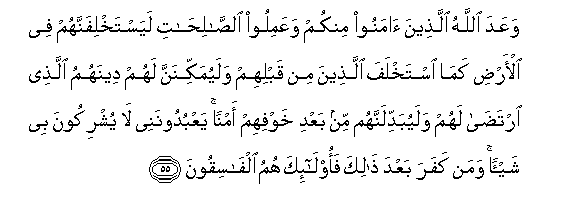
"Allah hath promised such of you as believe and do good works that He will surely make them to succeed (the present rulers) in the earth even as He caused those who were before them to succeed (others); and that He will surely establish for them their religion which He hath approved for them, and will give them in exchange safety after their fear. They serve Me. They ascribe nothing as partner unto Me. Those who disbelieve after that they are the miscreants". (Surah XXIV, ver. 55).
This divine promise still stands for all who fulfill its conditions. In it lies the real hope for Muslims today Arabs and all. But at the time of its revelation it bad a special application to the Arabs, and in fact was to them fulfilled to the letter.
This and similar Divine promises released the latent potentialities of the believing Arab tribes who were in time driven forth by the heat of faith and power of conviction, disestablishing old sovereignties and monarchies, raising the tremendous cry ("God is Greater (than All else). God is Greater (than All else), I testify that there is no true God but Allah, and that Muhammad is surely Allah's Prophet".
2- Faith In Revealed Books
The Islamic Call in the core recognises and acknowledges the fact that it is an extension of the Call of Abraham the father of the Arabs through his son Ismael; so says the Holy Qur�an:
![]()
"The faith of your father Abraham, He hath named you Muslims of old time and in this (Scripture)" (Surah XXII, 78).
This means that the followers of Abraham and the Muslims are one in that their respective creeds constitute orthodox Islam; further, that the prophet Muhammad was divinely commissioned to restore to its former status the first creed of Monotheism in its full strength and cogency:

"Lo! those of mankind who have the best claim to Abraham are those who followed him, and this Prophet and those who believe (with him) and Allah is the protecting Friend of the believers" (Surah III, 68)
As regards the core of Abraham�s religion our knowledge of it is restricted to what is mentioned in the holy Qur�an. Still we can emphasize the fact borne out by the above, that the two religions, if not identical in rites and legislation, are at least near enough when account is taken of time and circumstances.
The Islamic religion acknowledges the revealed books primarily the Torah and the Gospel. These are stated to have been divinely revealed to Moses and Jesus respectively for the guidance of humanity in part. As Jesus was preceded by Moses, so God sent Muhammad after Jesus to terminate the line of Prophets and Apostles. This point the holy Qur�an elucidates in the following text:
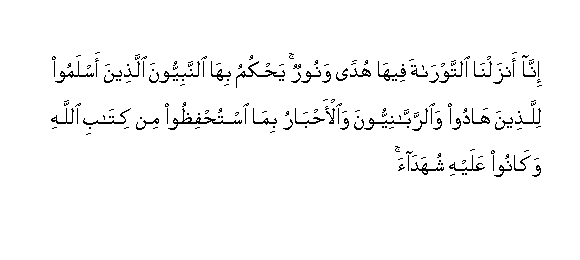
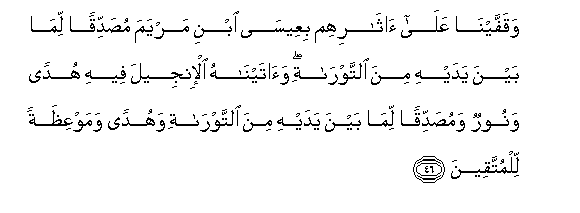
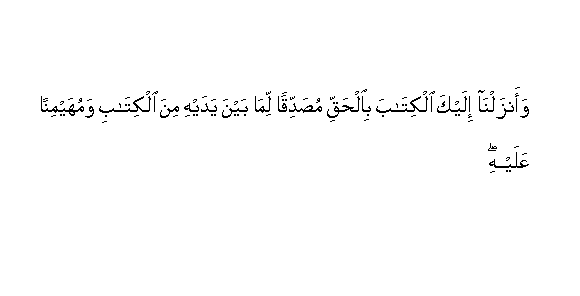
"Lo ! We did reveal the Torah, where in is guidance and light, by which the Prophets who surrendered (unto Allah) judged the Jews, and the rabbis and the doctors (judged) by such of Allah�s Scripture as they were bidden to observe, and thereunto were they witnesses So fear not mankind, but fear Me. And barter not My revelations for a little gain. Whoso judgeth not by that which Allah hath revealed : such are disbelievers.. And We caused Jesus, Son of Mary, to follow in their footsteps; confirming that which was (revealed) before him in the Torah and We bestowed on him the Gospel wherein is guidance and light, confirming that which was (revealed) before it in the Torah - a guidance and an admonition unto those who ward off (evil) And unto thee have We revealed the Scripture with the truth, confirming whatever Scripture was before it, and a watcher over it" (Surah V, verses 44, 46, 48 - in part).
Islam then did not come to pull down past religions but to corroborate and acknowledge them and correct any interpolations. It admitted the past function and role of Christianity and Judaism, and their respective contribution to human welfare. Any criticism passed by Islam on them as they stand at present is ascribed to interpolations and wrong interpretations introduced by certain of the clergy.
"O ye who believe! Lo!! many of the (Jewish) rabbis and the (Christian) monks devour the wealth of mankind wantonly and debar (men) from the way of Allah ". (Surah IX, 34 - in part). This point is admitted by H. G. Wells who remarks that "the text of the Gospels, though probably tampered with during this period, was not destroyed"[3].
This right attitude of the Call of Islam was a strong factor in converting to Islam from Christianity and Judaism many of the Arab tribes in the Ghassanite and Muntherite States and in Yemen. They could not refuse the Islamic Call with its Arab Prophet, and its revealed Arabic Book, believing as it does in all divine prophets and messengers, and in the Torah and the Gospel as originally revealed. How could they have refused it and continued in another religion containing as it were much that was contrary to their nature and which certain circumstances made them adopt? They found in the New Faith, in addition to the right monotheism, a wonderful system combining all that was essential and general in past religious legislations with much that was new and consonant with human nature. As an example of the confirmatory part, may be mentioned what God Himself states in the Holy Qur�an relating to retribution in the Torah, which still stands in Islam as Divine law:
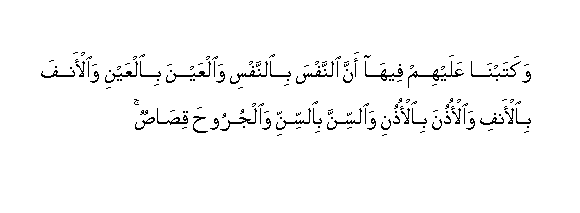
"And We prescribed for them therein : The life for the life and the eye for the eye, and the nose for the nose, and the ear for the ear, and the tooth for the tooth and for wounds retaliation, But whoso forgoeth it (in the way of charity) it shall be expiation for him". (Surah V, 45 - in part)
The Torah is a heavenly book, and it is impossible that the permanent part of its legislation would not be reinstated by the final divine book the Qur'an. This fact was overlooked by many scholars in their study of the Islamic Call, Certain polytheists in the early phase of the Call accused it of having been taken from Judaism and Christianity. In this unwarrantable assumption they were followed by Orientalists and foreign non-Muslim historians of religion, especially George Foot Moore, of Harvard University, America, who claims that all the dogmas of Muhammad are derived from Christianity and Judaism, that the symbolic ablution is based on Judaic rites, that many terms used in prayer are derived from the Hebrew, and that Muslim belief in paradise is derived from corresponding Mosaic belief.[4]
Had the bias of such researchers been less, their honesty in pursuit of knowledge been more, they would not have maintained this erroneous claim, since they know. that Christ of their belief is only a replica of Buddha in the belief of the Hindous who also call Buddha the Messiah, believe him to have been begotten by the Spirit, a god who has taken on a human body, the Saviour of mankind who gave himself up as a sacrifice for the redemption of man and delivering humanity from sin. Nor was there any necessity for such a writer to take trouble to misrepresent a fact emphasised by the Holy Qur�an itself, namely that Islam, that is surrender to God, the One, was the true religion of all past Prophets, that all truly revealed books come from God and therefore should never disagree in principle or in fact, any such disagreement being necessarily due to human interpolation or misinterpretation.
A newly revealed religion should naturally put matters right concerning previous religions, especially the one immediately preceding it, confirming the true side, pointing out and condemning accretions and omissions with suitable legislation modifications to suit change in conditions. So did Christianity, concerning Judaism, and so did Islam concerning both. To correct external additions, and omissions is what is meant by the Holy Qur�an being a watcher over previous Scripture. Such could not have been the case had Islam been taken from Judaism and Christianity as Jewish and Christian writers claim. Islam differs essentially in important respects from past religions as they now stand. It puts for example an end to all belief in human divinities, completely denouncing the doctrine of the Divine in the form of man which is basic in Christianity, as in Buddhism before it. This in fact is one main Qur�anic theme. A few quotations will serve to illustrate the point.
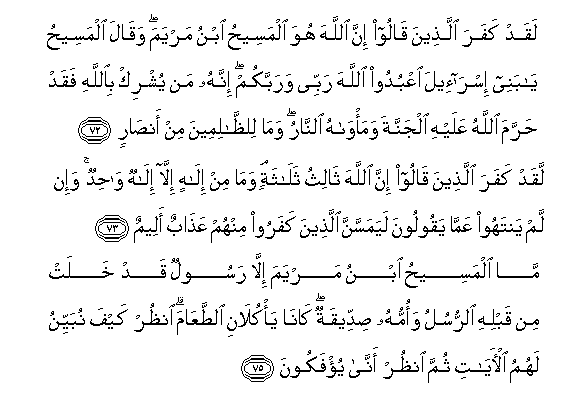
72) "They surely disbelieve who say : Lo ! Allah is the Messiah, son of Mary. The Messiah (himself) said : O children of Israel ! worship Allah, my Lord and your Lord. Lo! whoso ascribeth partners unto Allah, for him Allah hath forbidden Paradise. His abode is Fire; For evil-doers there will be no helpers.
73) "They surely disbelieve who say : Lo ! Allah is the third of three ; when there is no God save the One God. If they desist not from so saying a painful doom will fall on those of them who disbelieve".
75) "The Messiah, son of Mary, was none other than a messenger, Messengers (the like of whom) had passed away before him And his mother was a saintly woman. And they both used to eat (earthly) food. See how we make the revelations clear for them, and see how they are turned away ". (Surah V. after Pickthall�s Explanatory Translation)
The Prophet stressed the fact that he was only human for fear of Muslims claiming for him what Christians claim for Christ. This was recognised and appreciated by H. G. Welles when he wrote : " Warned by the experiences of Christianity Mohammad was very emphatic in insisting that he himself was merely a man and so saved his teaching from much corruption and misrepresentation"[5]
Another illustration in point is the denial by Islam of the view maintained by Christianity that man is by nature evil, and that the body inherits Adam�s sin when he responded to the call of the devil, leading it is claimed, to the statement of Jesus " My Kingdom is not of this world ", which led to monastic retirement.
Careful inquiry can find further essential differences between Islam and other religions - differences which arise from its being based on human nature arid so will appeal to every one of sound taste especially to the Arabs. It is not in human nature, and less still for an Arab, to respond to such a command by Jesus: (Ye have heard that it hath been said an eye for an eye, and a tooth for a tooth. But I say unto you, that ye resist not evil, but whosoever shall smite thee on thy right cheek turn to him the other also ). (St. Matt., 5138, 39) Again, undoubtedly the judgment in the Gospel relating to open alms-giving is somewhat harsh where it says (Dont give your alms before men, to be seen by them, otherwise ye have no reward of your Father which is in heaven), (St. Matt 6), if this is taken, as it usually is, to mean that all alms should be given in secret The Holy Qur�an adopts a milder tone.

"If you publish your alms-giving, it is well, but you hide it and give it to the poor, it will better for you and will atone for some of your ill-deeds. Allah Informed of what ye do". (Surah Al Baqara, ver. 271).
Such consideration of human nature by the Islamic Call was far- reaching. It disconcerted religions already in the field, and moved many of their believers to become converts to Islam, especially when the Divine Words struck their ears

"And he whoso sekeeth as religion other than Islam (the Surrender to Allah) it will not be accepted from him and he will be a loser in the Hereafter" . (Surah Al -Imran, ver. 85).
And also the divine announcement, decided and clear:

"He it is who hath sent His Messenger with the Guidance and the Religion of Truth, that He may cause it to prevail over all religions, however much the idolaters may averse" (Surah Al-Tawbah, ver 33).
3. Gradation in Reformation
On a previous occasion was discussed the question of how a call for reform or revolution can gain ground and ultimately establish itself through judicious application of psychological principles, pointing out that such a call can in no way eradicate, once for all, long stanching beliefs and customs, but must disestablish and supplant them very gradually according to a well considered plan as occasion and circumstances permit. This was the course taken by the Islamic Call in the reforms it intro duced. Gradation, where possible, was the rule especially in legislation, otherwise it would have been almost impossible for the masses to obey.
Fasting for example was not divinely ordained for a month all at once. It was first recommended for one day (Ashora) in the year, a day used to be kept by the Arabs in pre-Islamic days and also by the Jews of Madinah. Then came fasting for the duration of one month "Ramadan", with the licence for those who could keep it only with great difficulty to break it, provided that they should feed one poor man each broken day. Then came fasting without this licence except for the old. Under certain conditions, such as being ill or on travel, a Muslim can break the fast provided he should observe an equal number of days when he returns to normal conditions. Thus a reasonable institution of fasting was gradually established.
Similarly, drinking wine and other intoxicants became gradually forbidden. Wine being a common drink in pre-Islamic days, sudden prohibition of it would have had undue consequences. It is almost impossible to abstain all at once, and sudden prohibition may lead to indulging the pernicious habit in secret, which is sinful, may physically harm those who honestly observe it, or may even hinder conversion to Islam, which is the main aim in view.
Hence the reasonableness of gradual prohibition, and this was the course adopted by Islam. It first declared it more harmful than useful, and the wiser Muslims foresook it of their own when they heard God's answer to a question addressed to the Prophet concerning it and gambling.

"They question thee about wines and games of chance. Say : In both is great ?in and some utility for men ; but the sin of them is greater than their usefulness". (Surah Al Baqara, verse 299 in part).
This pronouncement admits of considerable latitude of interpretation. Some of the Prophet's companions took it to mean prohibition, and some did not see in it anything so definite, while the Prophet himself contradicted neither interpretation. Then came virtual prohibition by Muslims to pray when drunk, the five prayers being distributed throughout day and night.
![]()
"O ye who believe ! Draw not near unto prayer when ye are drunken, till ye know that which ye utter". (Surah Al Nisaa, verse 43 in part).
Then came absolute and complete prohibition in the Divine words revealed in the second year of the Higrah.

"O ye who believe! Wines and games of chance and idols and divining arrows are only an infamy of Satan's handwork. Leave it aside in order that ye may succeed". (Surah Al Ma'ida, verse 90).
Many of the duties in Islam, such as pilgrimage came to be obligatory only later on in the development of the Islamic Call. At the beginning, the Call Was centred in establishing monotheism and eradicating polytheism. The main evil then prevalent in the Arab community was idol worship, a wrong which not only indicated degenerate thought but made all spiritual progress impossible. Against it the Islamic Call directed all its effort. And it needed it all. Idolatry, it will be remembered, was for generations the established worship, instilled in the young, practised by the masses, and sustained by a heirachy of temple keepers and by all who drew from it either prestige or material gain. That its exposure and suppression was the main theme of the Meccan surahs, is illustrated by one of the earliest, the Surah of "Al-Mozzammil" or the "Enshrouded One" from which may be quoted.

"And remember the name of thy Lord and devote thyself to Him with a complete devotion Lord of the East and the West ; there is no God save Him ; so choose Him, alone for thy defender". (Surah 73, ver 8, 9).
Most of this chapter and the subsequent chapters advance arguments to establish monotheism and condemn idol-worship as an approach to God, whereas in respect of Divine cardinal obligations in the Meccan surahs, prayers only is emphasized, alms-giving or Zakat belonging to revelations at Madinah.
The fact that the Revealed Book of the Islamic Call was not revealed as a whole but in gradual stages over twenty three years is due, amongst other reasons, to the developmental character of the Islamic Reform, lest both those who believed and those called on to believe be bewildered and overwhelmed by the complexity of the far reaching Reform. Questions used to be asked, and situations used to arise, and the Prophet dealt with each inspired by revelation or on his own initiative by reason under divine correction. Such verdict by word or by action became an authoritative pronouncement binding on all Muslims.
It is now generally admitted that any idea or call, party or body, crowding itself or its constitution with detailed articles, can scarcely secure the response necessary for its success; and those responsible for it may meet with violent criticism when matters grow difficult, and circumstances unfavourable, the hostile critic finding the crowded material subtle means for breathing his venom and defaming the cause.
It will be remembered that the Socialist movement started by Marx and Friedrich Engels centred around a ((Manifesto)) issued by both comprising ten articles which presented the socialistic attitude in a moderate practical manner coupled with a demand that the German government should put it into effect. Such practical moderate simple presentation laid the basis for the later success of the call of socialism.
[1] A cloak was spread, the black stone put on it, a representative of each tribe was selected, the representatives were asked each to take hold of a suitable part of the cloak and to lift it all together near to the niche were the stone was to be put. Then Muhammad himself put it in place, not one of the idolaters.
[2]��� P. 16, Islam at the crossroads.
[3] Outhine of history ; p. 542
[4] George Foot Moore; The History of Religions; pp. 398, 477, 478, 488.
[5] Outline of History, p. 533
